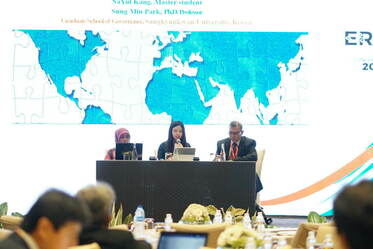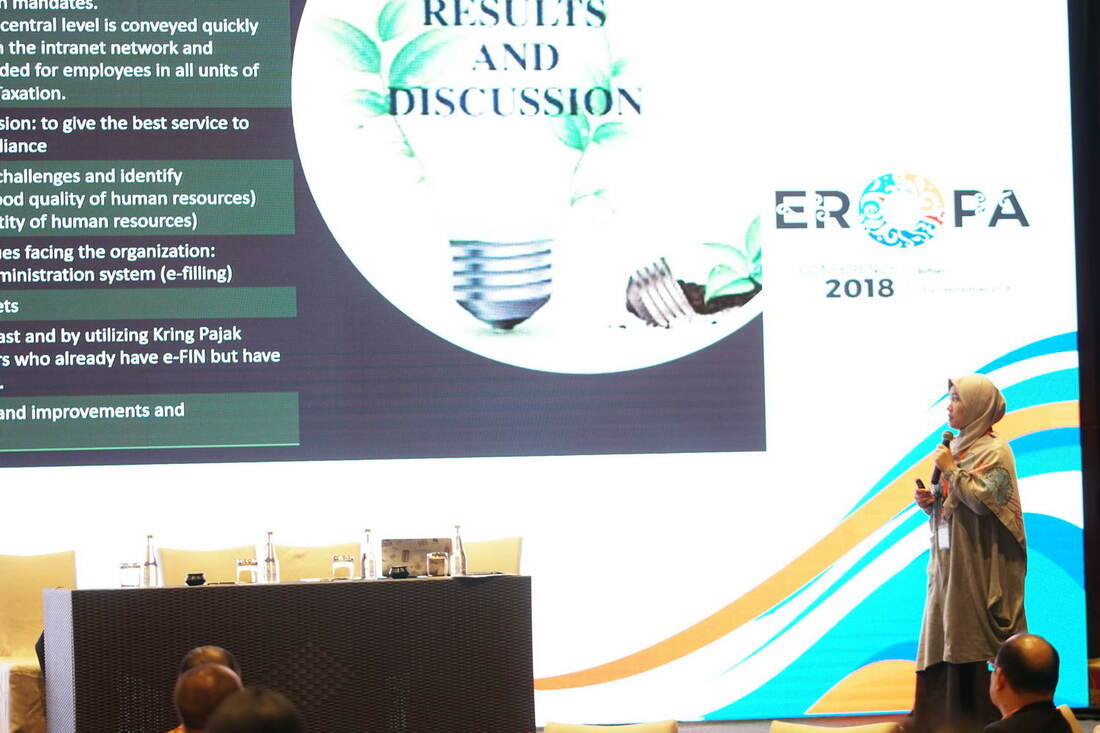|
Chaired by Mr. Muhammad Taufiq, this session dealt with people in Public Administration. The presenters for this session are: Ms. Suwatin and Ms. Nayul Kang.
In a paper entitled A Configurational Examination of Skill Mix in High Efficacy Community Health Centers in Indonesia, Ms. Suwatin aimed for her study to focus on how skill mix contributes to the organizational performance of community health centers (CHC) in Indonesia. To conclude, Dr. Suwatin shared the findings of the study. The findings showed that skill mixes ranging from five to six skills led to high efficacy CHCs. All function groups are almost always present, indicating complementarity. There was significant evidence found within group substitution, but not so much between group substitution. Afterwards, Ms. Kang presented her paper on A Comparative International Study of Organizational Culture, Public Service Motivation, and Organizational Commitment. Recognizing that there is an increasing demand for organizational change and performance in the local government scene today, Ms. Nayul Kang argued the need to study organizational culture and how it affects public service motivation (PSM), organizational commitment, and attitudes in local government units. The study compared survey data results obtained from the two countries - Korea and the Philippines - and found the following similarities: First, group culture had positive influence on development culture, while development culture had positive influence on rational culture. Second, rational culture also had a positive effect on PSM in both Korea and the Philippines. Third, public service motivation had a positive effect on organizational commitment. Meanwhile, major differences were also observed, which were as follows: First, the hierarchy culture had a negative effect on developmental culture in Korea, while significant result values were not derived between the two factors in the Philippines. Second, hierarchy culture in Korea had a positive impact on rational culture and PSM, but was not significant in the Philippines. Third, development culture had a positive effect on organizational commitment in Korea, while rational culture had a positive effect on organizational commitment in the Philippines. Lastly, in Korea, it was confirmed that the longer the length of service, the more positive it had on organizational commitment, whereas in the Philippines, it had a negative impact.
0 Comments
Leave a Reply. |
2018 EROPA CONFERENCE BULLETINThis page contains news articles from during the conference proper of the 2018 EROPA Conference. ArchivesCategories
All
|
- Home
- About
-
Publications
- Public Administration News
-
ARPA
>
- ARPA Scope and Objectives
- ARPA Editorial Board
- ARPA Call for Papers
- Submit Article
-
ARPA Open Access
>
- India (2020-2023, Vol. 31, Nos. 1&2, pg. 4-22)
- Nepal (2020-2023, Vol. 31, Nos. 1&2, pg. 23-46)
- Vietnam (2020-2023, Vol. 31, Nos. 1&2, pg. 47-67)
- China (2020-2023, Vol. 31, Nos. 1&2, pg. 68-79)
- South Korea (2020-2023, Vol. 31, Nos. 1&2, pg. 80-99)
- Bangladesh (2020-2023, Vol. 31, Nos. 1&2, pg. 100-119)
- USA (2020-2023, Vol. 31, Nos. 1&2, pg. 120-141)
- Abstracts >
- Publication Ethics and Malpractice Statement
- Notes for Contributors
- Journal Indexing
- EROPA Bulletin >
- Resources >
- Membership
-
Conferences
-
Activities
- #TAG Dialogue
- Contact Us
- Home
- About
-
Publications
- Public Administration News
-
ARPA
>
- ARPA Scope and Objectives
- ARPA Editorial Board
- ARPA Call for Papers
- Submit Article
-
ARPA Open Access
>
- India (2020-2023, Vol. 31, Nos. 1&2, pg. 4-22)
- Nepal (2020-2023, Vol. 31, Nos. 1&2, pg. 23-46)
- Vietnam (2020-2023, Vol. 31, Nos. 1&2, pg. 47-67)
- China (2020-2023, Vol. 31, Nos. 1&2, pg. 68-79)
- South Korea (2020-2023, Vol. 31, Nos. 1&2, pg. 80-99)
- Bangladesh (2020-2023, Vol. 31, Nos. 1&2, pg. 100-119)
- USA (2020-2023, Vol. 31, Nos. 1&2, pg. 120-141)
- Abstracts >
- Publication Ethics and Malpractice Statement
- Notes for Contributors
- Journal Indexing
- EROPA Bulletin >
- Resources >
- Membership
-
Conferences
-
Activities
- #TAG Dialogue
- Contact Us



 RSS Feed
RSS Feed